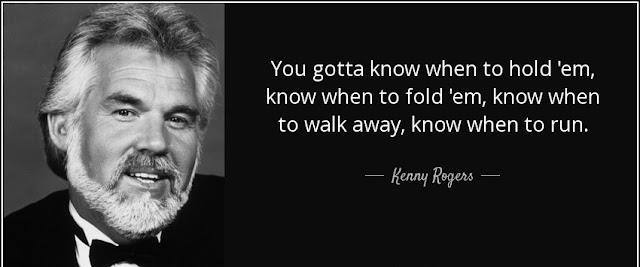

You Gotta Know When To Hold 'em, Fold 'Em, Walk Away or Run!
As Kenny Rogers sang "You gotta know when to hold 'em, know when to fold 'em, know when to walk away, and know when to run".
This advice also applies to real estate investing...not just poker. With Buy and Hold properties, you've got to know how long to hold them before you sell. When you tour properties or negotiate a deal you've got to know when to walk away and when to run. While Kenny goes on to say you should never count your money before you leave the table, you really should calculate a investment's potential as this will determine your ability to stay or walk away.
Investors looking at "Buy and Hold" are traditionally looking to see how long it will take for a property to double in value often using the Rule of 72. You're holding a property for cash flow while building equity through appreciation. But If you are holding onto an investment property that just isn't making the return it once was, you may want to take a hard look as to why that's occurring. While you may only need to make some minor adjustments, don't be afraid to sell something that is no longer working for you. Just like poker, each real estate transaction needs to be analyzed, options (cards) moved around and offers (wagers) made based upon other hands and what's still in the deck. In poker, when and what cards to play takes thought, calculation and a little risk. With investing, the same rules apply. Take a look at your investments you currently have. Are they still making you money, or can you make adjustments without having them fall apart?
Ok, so that's fine for investments you already have, but what about ones you are working on to acquire? How do you know when to walk away and when to run?
Remember, there are always other properties out there. A good rule of thumb is to look at as many properties as you can, make as many offers as you feel comfortable with, but only buy the best ones available. Many times we get into such a mindset of what we want that we may miss or dismiss the red flags along the way. We all want that perfect money making investment property, but we also need to dig ourselves out of a "tunnel vision" mode by taking a hard look at the property.
>> TRUE STORY: Take a look at the rear view of this home. It looked fine (from the front) in the internet listings. I showed it to a client who felt like it was salvageable and could be turned into a money-maker. See the cracks? The picture makes it tough to see, but front back and sides (and basement...OMG) showed signs of sinking. No, not a sink hole...but PA Mine Subsidence! YIKES. Not only did I want to walk away..I wanted to run. But my client, who knows his stuff, was certain we could save it. After a visit from the structural engineer, he gave in and we RAN. We will find him another property, but this one probably ought to be torn down. Moral of the Story: Watch the details, don't get caught up in the price, and move on when your gut (and your Realtor) tells you to!
You took the time to save the money, sacrificing a lot in order to to buy, so no need to throw good money at bad. Analyze your options and most definitely take another set of eyes with you when looking at properties. Preferably someone with experience who looks at properties every single day. It takes time to review properties, not just on the internet, but also touring in person. And this a huge life-changing decision that should be handled with care.
So let's say you've been looking at properties for sale. And financially, you either have the capital right now, or have obtained a pre-approval on an amount that a lender will loan you. Great! So now you're in the game, looking closely at homes and/or investment properties. The asking price looks good, it's right for you and/or your family or team, and the potential return looks promising. You get there with your Realtor, a fellow Investor, A Wholesaler, a friend or by yourself and something doesn't look or even feel right. The physical condition may be more than just being a mess inside or less than what you expected as cosmetic things can always be fixed. While pictures speak more than a thousand words, once you get there it may feel that they were taken with "smoke and mirrors". If it's just cosmetic, any property can become your dream with the right touches. However, what I'm talking about are serious issues such as structural or other hidden problems that will bleed you dry, money-wise. At first, you might think that could increase your negotiating power with the seller of the property, but they may be unwilling to waiver. The moral here is that sometimes things are indeed "too good to be true". Here's where a good Realtor and/or Contractor will point out things to help you in your decision. Note though that not all Realtors are created equal.
Being a professional Realtor isn't just about making a sale. If you are residential consumer, then going with someone who has proven experience on the residential real estate side is the way to go. Someone who knows the market well is important along with possessing great negotiation skills. If you are looking to invest in Real Estate, you need a Realtor with investment property experience because the two beasts are very different from each other. You need someone who is in it not just for the sale, but for the relationship. You need a consultant and a confidante. If you are going it alone, you still need great negotiation skills to put a deal together.
Investing in real estate takes organization, planning, analysis and negotiation--a lot of the traits that are valuable in playing poker. You will always want to research properties so that you are not playing your cards without looking at your hand. And don't play your aces too soon, but also do go all in when you need to. Be prepared to know when to hold em', when to fold 'em, when to walk away and when to run!!












Comments